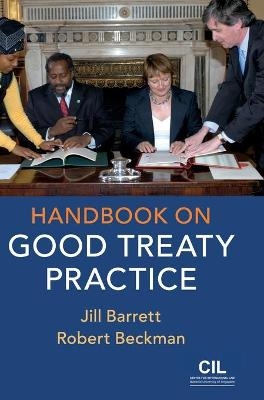
Handbook on Good Treaty Practice
Cambridge University Press (Verlag)
978-1-107-11190-5 (ISBN)
This Handbook aims to provide practical guidance on good treaty practice. It presents a range of examples from the practice of several States and international organisations and explains the actions that need to be taken to create a new treaty, bring it into force, operate it, amend it and wind it up, on both the international and the domestic plane. It also explores what constitutes good treaty practice, and develops generic principles or criteria against which to evaluate these examples. It provides a useful analytical tool to enable each government and international organisation to identify and develop the best treaty practice for their circumstances, recognising that one size does not necessarily fit all. It will be of interest to those working with treaties and treaty procedures in governments, international organisations and legal practice, as well as legal academics and students wishing to gain insight into the realities of treaty practice.
Jill Barrett is Visiting Reader in the School of Law, Queen Mary University of London and Associate Member, 6 Pump Court Chambers. She also works independently as an international law consultant and advises UK parliamentary committee inquiries on the role of Parliament in scrutinising treaties. Previously, she was the Arthur Watts Senior Research Fellow in Public International Law at the British Institute of International and Comparative Law and, before that, she was Legal Counsellor at the Foreign and Commonwealth Office (FCO). Throughout her twenty-year FCO career she negotiated, drafted and advised on numerous treaties and represented the UK at the United Nations and international conferences. She led the UK Government's work on creating a statutory regime on ratification of treaties in the Constitutional Reform and Governance Act 2010. She supervised the FCO Treaty Section and developed new ways of delivering treaty services to the UK Government and the public. Robert Beckman is the Head of the Ocean Law and Policy programme and the former Director of the Centre for International Law (CIL), National University of Singapore (NUS). He is also an Associate Professor at the NUS Faculty of Law, where he has taught for more than thirty years on Public International Law, UN Law, and Ocean Law and Policy. He co-authored Promoting Compliance: The Role of Dispute Settlement and Compliance Mechanisms in ASEAN Instruments (2016) which looked into hundreds of ASEAN instruments to dissect the ASEAN treaty practice in promoting and encouraging domestic compliance. He is an expert on the issues of law of the sea in Southeast Asia, including maritime security, piracy, governance of submarine cables, and the South China Sea disputes. He has co-directed the special project on treaty law and practice at CIL since 2012.
1. Introduction to good treaty practice; 2. Organising treaty work in governments and international organisations; 3. Treaties and other kinds of international instruments; 4. Managing and using treaty collections; 5. Making a new treaty (negotiation, drafting, production); 6. Preparing to become party to a treaty; 7. Becoming party to a treaty – consent to be bound and entry into force; 8. Continuing engagement with the treaty throughout its life; 9. Ending treaty relations; 10. Future of treaty practice.
| Erscheinungsdatum | 18.03.2020 |
|---|---|
| Zusatzinfo | 17 Tables, black and white; 2 Halftones, black and white; 1 Line drawings, black and white |
| Verlagsort | Cambridge |
| Sprache | englisch |
| Maße | 172 x 250 mm |
| Gewicht | 1030 g |
| Themenwelt | Recht / Steuern ► EU / Internationales Recht |
| Recht / Steuern ► Öffentliches Recht ► Völkerrecht | |
| Sozialwissenschaften ► Politik / Verwaltung ► Europäische / Internationale Politik | |
| Wirtschaft ► Volkswirtschaftslehre ► Makroökonomie | |
| ISBN-10 | 1-107-11190-0 / 1107111900 |
| ISBN-13 | 978-1-107-11190-5 / 9781107111905 |
| Zustand | Neuware |
| Haben Sie eine Frage zum Produkt? |
aus dem Bereich


